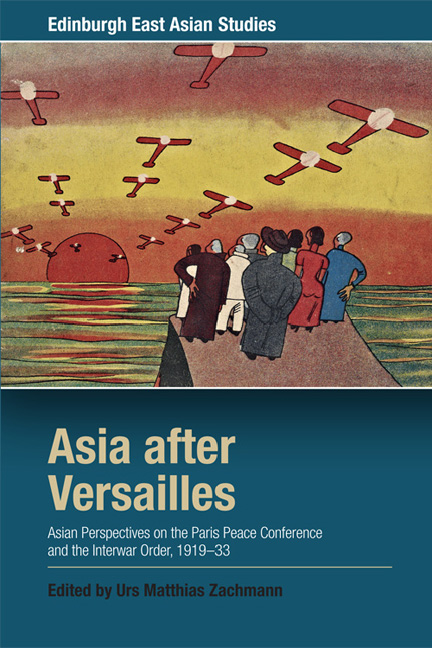 Asia after Versailles
Asia after Versailles Book contents
- Frontmatter
- Contents
- List of Illustrations
- Notes on Contributors
- Acknowledgments
- Introduction: Asia After Versailles
- Part I
- 1 The Correlation of Crises, 1918–20
- 2 Muslim Asia after Versailles
- 3 From Versailles to Shanghai: Pan-Asianist Legacies of the Paris Peace Conference and the Failure of Asianism from Below
- Part II
- Index
3 - From Versailles to Shanghai: Pan-Asianist Legacies of the Paris Peace Conference and the Failure of Asianism from Below
from Part I
Published online by Cambridge University Press: 22 December 2017
- Frontmatter
- Contents
- List of Illustrations
- Notes on Contributors
- Acknowledgments
- Introduction: Asia After Versailles
- Part I
- 1 The Correlation of Crises, 1918–20
- 2 Muslim Asia after Versailles
- 3 From Versailles to Shanghai: Pan-Asianist Legacies of the Paris Peace Conference and the Failure of Asianism from Below
- Part II
- Index
Summary
In the past decade, the focus of the debate on ‘Asia’ as a political concept has shifted from examining what ‘Asia’ means to how ‘Asia’ means. The major inspiration for this new Asia discourse is derived from the writings of the Japanese Sinologist and critic Takeuchi Yoshimi (1910–77). In ‘Asia as method’ (1961), Takeuchi had distinguished between ‘Asia as an object’ (taishō) and ‘Asia as a method’ (hōhō). Advancing the latter, Takeuchi provided relief from the search for Asia's distinctive substance (jittai), which almost inevitably leads to the conclusion that, historically Asia is a heterogeneous and eventually empty, foreign-imposed category, nothing but the West's ‘backward’ Other. Instead, Takeuchi proposed grasping Asia primarily as a method to criticise defects of Western modernity. This critique, according to Takeuchi, could consecutively generate a process of Asia's self-formation. In addition, by applying ‘Asia as a method’ to the West, Asia could transform the West itself ‘in order to raise to a higher level the universal values that were themselves engendered by the West’. In the present-day politico-intellectual discourse, which links the critique of capitalism and globalisation to the debate of Asia in general and to visions of an East Asian community in particular, public intellectuals throughout East Asia have arduously been promoting this Takeuchian understanding of Asia.
Historically, the First World War constitutes one of the first instances during which the concept of Asia was linked by people from different parts of Asia to criticism of the assumed superiority of Western modernity and of globalisation along Western standards. Encouraged by the self-destructive Great War and incited by continuous racial discrimination, numerous Asian thinkers embarked on a full-scale attack on European civilisation as the emblem of Western materialistic modernity. Simultaneously, the hitherto neglected concept of Asia was re-evaluated. Constrained by the legacies of the traditional Sinocentric order, in the case of China, and of the pursuit of ‘Europeanisationism’ (Japanese Ōkashugi), in the case of Japan, this embrace of Asia occurred only in a hesitant and piecemeal fashion. Asia's ‘Asia’ itself, both in its imagination and reality, needed to be transformed before Asians could speak affirmatively on behalf of ‘Asia’ to Asians and to the West.
- Type
- Chapter
- Information
- Asia after VersaillesAsian Perspectives on the Paris Peace Conference and the Interwar Order, 1919-33, pp. 77 - 98Publisher: Edinburgh University PressPrint publication year: 2017


